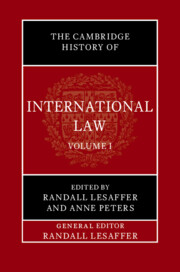Book contents
- The Cambridge History of International Law
- The Cambridge History of International Law
- Frontispiece
- The Cambridge History of International Law
- Copyright page
- Contents
- Plates
- Tables
- Contributors
- Preface
- 1 Scope, Scale and Humility in the History of International Law
- Part I The Historiography of International Law
- Part II The Historiography of International Law
- 6 The Historiography of International Law in East Asia
- 7 The Historiography of International Law in Sub-Saharan Africa
- 8 Historiography of International Law on the European Continent
- 9 The Historiography of International Law in Russia and Its Successor States
- 10 ‘The Most Neglected Province’
- 11 The View from the US Leviathan
- 12 Using History in Latin America
- Index
- Plate Section (PDF Only)
- References
12 - Using History in Latin America
from Part II - The Historiography of International Law
Published online by Cambridge University Press: 06 December 2024
- The Cambridge History of International Law
- The Cambridge History of International Law
- Frontispiece
- The Cambridge History of International Law
- Copyright page
- Contents
- Plates
- Tables
- Contributors
- Preface
- 1 Scope, Scale and Humility in the History of International Law
- Part I The Historiography of International Law
- Part II The Historiography of International Law
- 6 The Historiography of International Law in East Asia
- 7 The Historiography of International Law in Sub-Saharan Africa
- 8 Historiography of International Law on the European Continent
- 9 The Historiography of International Law in Russia and Its Successor States
- 10 ‘The Most Neglected Province’
- 11 The View from the US Leviathan
- 12 Using History in Latin America
- Index
- Plate Section (PDF Only)
- References
Summary
Latin American international lawyers are prolific historians. However, while having profusely written histories of international law, Latin Americans have shied away from historiographic controversy. Latin Americans have not disagreed much about how to conceive and write history, but they have had sound disagreements about the international law that is constructed by history, they have disagreed over different ways of using history as law. This chapter offers a history of these disagreements. Some Latin-Americans have used universal histories, echoing the familiar Eurocentric history from the Latin-American periphery to the core, in order to gain doctrinal authority to speak and change international law. With a similar goal in mind, other Latin-Americans have used particularistic histories, foregrounding the region’s doctrinal divergences and contributions to universal international law. Universalist and particularistic histories were dominant between the first half of the nineteenth century and the second half of the twentieth century, between independence and the Cold War. Towards the end of the Cold War, these two types of history merged into one, presenting the region’s historical trajectory as in harmony with universal international law. This represents a break. If in the nineteenth century an international legal tradition emerged in Latin-America, during the twentieth century it radicalised, diverging from international law as conceived from the West. From the Cold War merger an endemic history emerged, which depoliticised and deradicalised the Latin American tradition. Exploring this history of history-writing in the region may help rearticulating a more ambitious Latin American international law.
- Type
- Chapter
- Information
- The Cambridge History of International Law , pp. 378 - 427Publisher: Cambridge University PressPrint publication year: 2024

